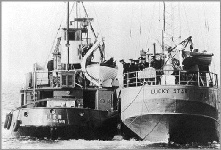© 2014-


Radio Mercur - History (4)
Other changes were also taking place -
At about the same time Radio Mercur entered into initial discussions with the northern Swedish offshore station, Radio Nord, whose owners were keen on establishing a television service. Radio Nord’s vessel, Magda Maria was anchored in the Stockholm Archipelago, but this was too wide to achieve satisfactory television transmissions into the Stockholm city area. It was decided therefore that any offshore television project would have to be based in the south of the country with programmes beamed to Sweden's next largest city, Malmo, from a vessel anchored in Oresund.
A joint venture was officially entered into by Radio Nord and Radio Mercur -
Unfortunately the introduction of pan-
Following a recommendation by a special committee of the Nordic Council in February 1962 a concerted approach was agreed by four Scandinavian governments to deal with the 'problem' of offshore radio stations. The four governments in question -
The Danish legislation was introduced into parliament on 3rd April 1962 by the Minister of Communications, Kai Lindberg, and about the same time a listeners support organisation -
However Danish legislation to outlaw offshore broadcasting -
In the face of the impending ban Radio Mercur closed its 'West' station from the Cheeta 2 on 10th July 1962 and the ship sailed to Ekensburg in Sweden amidst rumours of plans that she would become an offshore station anchored off Greece. However, the vessel was subsequently sold to Britt Wadner, owner of Radio Syd, which had decided to stay on the air in defiance of the new legislation. The airtime sales company -
Radio Mercur (East), on board the Lucky Star anchored off Copenhagen, continued to broadcast for a further three weeks, closing only when the new law came into effect at midnight on 31st July 1962. The final hour was a nostalgic look back at the history of the station with programme excerpts and 'good luck' messages from former announcers. Earlier the same day the entire Radio Mercur record library had been sold at an auction in Copenhagen.
That was not the end of the story for Radio Mercur, however. After the station had closed the Lucky Star remained at sea and a report in Ekstra Bladet on 1st August carried a report quoting a Liechtenstein lawyer acting on behalf of Radio Mercur Establissement Technique International saying that the station’s owner (who was not named) planned to continue broadcasts without breaking the new Danish law. Programmes would be recorded abroad, using Danish speaking announcers, and advertising would also come from foreign based companies, mainly in West Germany.
After a week of silence from the Lucky Star, (during which time the Siemens transmitter had been transferred to Cheeta 2 and the original home built equipment installed on the Lucky Star), transmissions were started once again at 5.00pm on 13th August 1962, using some of the station's old programme tapes. The original Radio Mercur owners denied any responsibility for these transmissions and stated that during the life of the station they had only ever hired the ship, through an associate company, from the vessel's actual owner, Senor Louis Arturo Delboso of Guatemala.
Two days later, on 15th August 1962, two Danish police ships, Knud and Valdemar approached the Lucky Star and armed police boarded the vessel. Later a customs vessel escorted her into port at Tuborg, the Lucky Star was impounded and a long legal battle followed to establish ownership and responsibility for the illegal broadcasts.
The Danish authorities were accused of acting illegally by boarding and impounding a foreign registered ship in international waters. However, it was quickly established that the Lucky Star had no official registration papers and the Lebanese flag she was flying from her stern was a fake. At the end of September 1962 the Lucky Star’s owner, Senor Delboso, instructed lawyers to seek repossession of his ship.
A hearing took place in the High Court on 23rd October 1962 when the lawyer acting for Radio Mercur (Etablissement de Technique International in Liechtenstein) conceded that the confiscation of the ship and its broadcasting equipment by the Danish authorities had been a legal act.The company was fined 8,000 Kroner with 4,000 Kroner costs -


Click on picture to enlarge

Berlingske Aftenavis
16th August 1962

The Times
17th August 1962

Swedish newspaper report
?? August 1962
Ingemar Lindqvist
‘Copenhagen Today’ closedown announcement, June 1962

Sticker attached to records sold at the auction
Above:
Two views of the police raid on the Lucky Star after it had recommenced broadcasts in violation of the new Danish law

Newspaper placard -
Newspaper placard -



Sound recording of the close of Radio Mercur showing that the station in fact closed 40 seconds earlier than it could have done before ‘Lex Mercur’ came into force, 31st July 1962

History
Key Dates
Ship and Location
Technical
Staff
Programmes





For more about
Radio Mercur visit

YEARS

In the Special Exhibitions Gallery on the Ground Floor

Treasure Chest


Back to Radio Mercur

Back to Scandinavia Gallery

